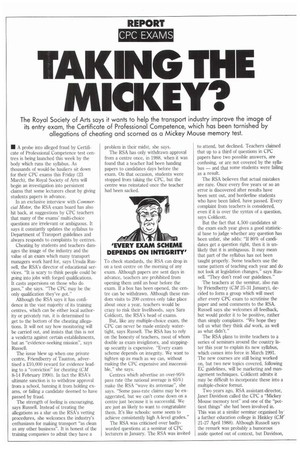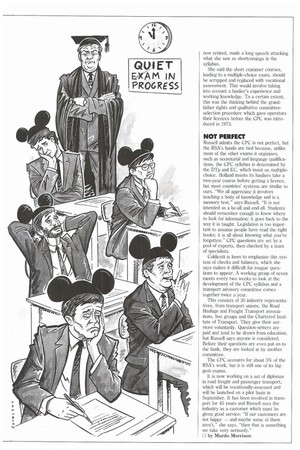TAKING THE MICKEY?
Page 56

Page 57

If you've noticed an error in this article please click here to report it so we can fix it.
The Royal Society of Arts says it wants to help the transport industry improve the image of its entry exam, the Certificate of Professional Competence, which has been tarnished by allegations of cheating and scorned as a Mickey Mouse memory test.
• A probe into alleged fraud by Certificate of Professional Competence test centres is being launched this week by the body which runs the syllabus. As thousands of would-be hauliers sit down for their CPC exams this Friday (23 March), the Royal Society of Arts will begin an investigation into persistent claims that some lecturers cheat by giving students papers in advance.
In an exclusive interview with Commercial Motor, the RSA exam board has also hit back, at suggestions by CPC teachers that many of the exams' multi-choice questions are irrelevant or ambiguous. It says it constantly updates the syllabus to Department of Transport guidelines and always responds to complaints by centres.
Cheating by students and teachers damages the image of the industry and the value of an exam which many transport managers work hard for, says Ursula Russell, the RSA's director of educational services. "It is scary to think people could be going into jobs with forged qualifications. It casts aspersions on those who do pass," she says. "The CPC may be the only qualification they've got."
Although the RSA says it has confidence in the vast majority of its training centres, which can be either local authority or privately run, it is determined to get to the bottom of the cheating allegations. It will not say how monitoring will be carried out, and insists that this is not a vendetta against certain establishments, but an "evidence-seeking mission", says Russell.
The issue blew up when one private centre, Friendberry of Taunton, advertised a .V0,000 reward for evidence leading to a "conviction" for cheating (CM 8-14 February 1990). In fact the RSA's ultimate sanction is to withdraw approval from a school, banning it from holding exams, or failing a candidate deemed to have passed by fraud.
The strength of feeling is encouraging, says Russell. Instead of treating the allegations as a slur on the RSA's vetting procedures, she welcomes the industry's enthusiasm for making transport "as clean as any other business". It is honest of the training companies to admit they have a problem in their midst, she says.
The RSA has only withdrawn approval from a centre once, in 1988, when it was found that a teacher had been handing papers to candidates days before the exam. On that occasion, students were stopped from taking the CPC, but the centre was reinstated once the teacher had been sacked.
To check standards, the RSA can drop in on a test centre on the morning of any exam. Although papers are sent days in advance, teachers are prohibited from opening them until an hour before the exam. If a box has been opened, the centre can be withdrawn. Although these random visits to 200 centres only take place about once a year, teachers would be crazy to risk their livelihoods, says Sara Coldicott, the RSA's head of exams.
But, like any multiple-choice exam, the CPC can never be made entirely watertight, says Russell. The RSA has to rely on the honesty of teachers, most of whom double as exam invigilators, and steppingup security is expensive. "Every exam scheme depends on integrity. We want to tighten up as much as we can, without making the CPC expensive and inaccessible," she says.
Centres which advertise an over-95% pass rate (the national average is 65%) make the RSA "wave its antennae", she says. "Some pass-rate claims may be exaggerated, but we can't come down on a centre just because it is successful. We are just as likely to want to congratulate them. It's like schools: some seem to achieve consistently high A-level grades."
The RSA was criticised over badlyworded questions at a seminar of CPC lecturers in January. The RSA was invited to attend, but declined. Teachers claimed that up to a third of questions in CPC papers have two possible answers, are confusing, or are not covered by the syllabus — and that some students were failing as a result.
The RSA believes that actual mistakes are rare. Once every five years or so an error is discovered after results have been sent out, and borderline students who have been failed, have passed. Every complaint from teachers is considered, even if it is over the syntax of a question, says Coldicott.
But the fact that 4,500 candidates sit the exam each year gives a good statistical base to judge whether any question has been unfair, she adds: "If 80% of candidates get a question right, then it is unlikely that it is ambiguous. It may mean that part of the syllabus has not been taught properly. Some teachers use the same pattern of teaching each year and do not look at legislation changes," says Russell. "They don't read our guidelines."
The teachers at the seminar, also run by Friendberry (CM 25-31 January), decided to form a group which will meet after every CPC exam to scrutinise the paper and send comments to the RSA. Russell says she welcomes all feedback, but would prefer it to be positive, rather than simply complaints. "We hope they tell us what they think did work, as well as what didn't."
The RSA plans to invite teachers to a series of seminars around the country later this year to explain its new syllabus, which comes into force in March 1991. The new courses are still being worked on, but two new topics covered, following EC guidelines, will be marketing and management techniques, Coldicott admits it may be difficult to incorporate these into a multiple-choice format.
Two years ago, RSA assistant-director, Janet Davidson called the CPC a "Mickey Mouse memory test" and one of the "pottiest things" she had been involved in. This was at a similar seminar organised by• a further education college in Hinkley (CM' 21-27 April 1988). Although Russell says the remark was probably a humorous aside quoted out of context, but Davidson,
now retired, made a long speech attacking what she saw as shortcomings in the syllabus.
She said the short crammer courses, leading to a multiple-choice exam, should be scrapped and replaced with vocational assessment. This would involve taking into account a haulier's experience and working knowledge. To a certain extent, this was the thinking behind the grandfather rights and qualitative committeeselection procedure which gave operators their licences before the CPC was introduced in 1973.
NOT PERFECT
Russell admits the CPC is not perfect, but the RSA's hands are tied because, unlike most of the other exams it organises, such as secretarial and language qualifications, the CPC syllabus is determined by the DTp and EC, which insist on multiplechoice. Holland insists its hauliers take a two-year course before getting a licence, but most countries' systems are similar to ours. "We all appreciate it involves teaching a body of knowledge and is a memory test," says Russell. "It is not intended as a be-all and end-all. Students should remember enough to know where to look for information: it goes back to the way it is taught. Legislation is too important to assume people have read the right books; it is all about knowing what you've forgotten." CPC questions are set by a pool of experts, then checked by a team of specialists.
Coldicott is keen to emphasise this system of checks and balances, which she says makes it difficult for rougue questions to appear. A working group of seven meets every two weeks to look at the development of the CPC syllabus and a transport advisory committee comes together twice a year.
This consists of 30 industry representatives, from transport unions, the Road Haulage and Freight Transport associations, bus groups and the Chartered Institute of Transport. They give their services voluntarily. Question-setters are paid and tend to be drawn from education, but Russell says anyone is considered. Before their questions are even put on to the bank, they are looked at by another committee.
The CPC accounts for about 5% of the RSA's work, but it is still one of its biggest exams.
It is now working on a set of diplomas in road freight and passenger transport, which will be vocationally-assessed and will be launched on a pilot basis in September. It has been involved in transport for 45 years and Russell sees the industry as a customer which must be given good service: "If our customers are not happy — and maybe some of them aren't," she says, "then that is something we take very seriously."
11 by Murdo Morrison








































































































